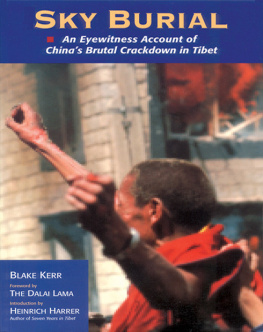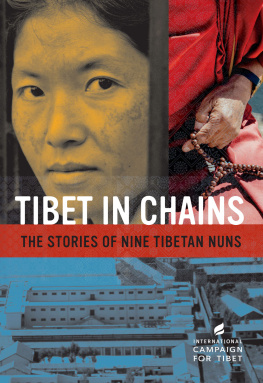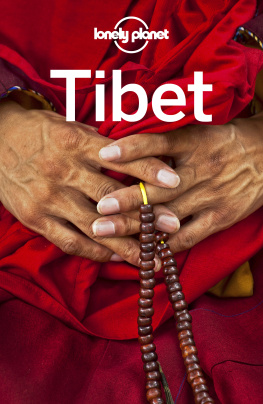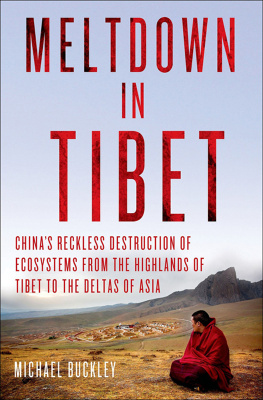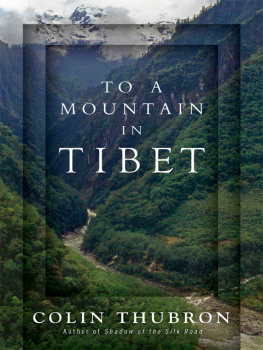Kerr - Sky burial: an eyewitness account of Chinas brutal crackdown in Tibet
Here you can read online Kerr - Sky burial: an eyewitness account of Chinas brutal crackdown in Tibet full text of the book (entire story) in english for free. Download pdf and epub, get meaning, cover and reviews about this ebook. City: Ithaca;N.Y;Tibet Autonomous Region (China);China;Tibet Autonomous Region, year: 1997, publisher: Snow Lion Publications, genre: Detective and thriller. Description of the work, (preface) as well as reviews are available. Best literature library LitArk.com created for fans of good reading and offers a wide selection of genres:
Romance novel
Science fiction
Adventure
Detective
Science
History
Home and family
Prose
Art
Politics
Computer
Non-fiction
Religion
Business
Children
Humor
Choose a favorite category and find really read worthwhile books. Enjoy immersion in the world of imagination, feel the emotions of the characters or learn something new for yourself, make an fascinating discovery.
- Book:Sky burial: an eyewitness account of Chinas brutal crackdown in Tibet
- Author:
- Publisher:Snow Lion Publications
- Genre:
- Year:1997
- City:Ithaca;N.Y;Tibet Autonomous Region (China);China;Tibet Autonomous Region
- Rating:3 / 5
- Favourites:Add to favourites
- Your mark:
- 60
- 1
- 2
- 3
- 4
- 5
Sky burial: an eyewitness account of Chinas brutal crackdown in Tibet: summary, description and annotation
We offer to read an annotation, description, summary or preface (depends on what the author of the book "Sky burial: an eyewitness account of Chinas brutal crackdown in Tibet" wrote himself). If you haven't found the necessary information about the book — write in the comments, we will try to find it.
Kerr: author's other books
Who wrote Sky burial: an eyewitness account of Chinas brutal crackdown in Tibet? Find out the surname, the name of the author of the book and a list of all author's works by series.
Sky burial: an eyewitness account of Chinas brutal crackdown in Tibet — read online for free the complete book (whole text) full work
Below is the text of the book, divided by pages. System saving the place of the last page read, allows you to conveniently read the book "Sky burial: an eyewitness account of Chinas brutal crackdown in Tibet" online for free, without having to search again every time where you left off. Put a bookmark, and you can go to the page where you finished reading at any time.
Font size:
Interval:
Bookmark:

S KY B URIAL
An Eyewitness Account
of Chinas Brutal Crackdown
in Tibet
BLAKE KERR
Snow Lion Publications
Ithaca, New York
Snow Lion Publications
P.O. Box 6483
Ithaca, New York 14851 USA
tel: 607-273-8519
Copyright 1997 by Blake Kerr
All rights reserved. No portion of this work may be reproduced by any means without written permission from the publisher.
ISBN-1-55939-080-8
Library of Congress Cataloging-in-Publication Data
Kerr, Blake.
Sky Burial: an eyewitness account of Chinas brutal crackdown in Tibet / Blake Kerr; foreword by the Dalai Lama; introduction by Heinrich Harrer.
p. cm.
Originally published : Chicago : Nobles Press, 1993
ISBN 1-55939-080-8 (alk. paper)
1. Tibet (China)Politics and government19512. Tibet (China)Description and travel. I. Title.
DS786.K39 1997
951'.5dc21
97-33448
CIP
When the iron bird flies and horses run on wheels, the Tibetan people will be scattered like ants across the world and the Dharma will come to the land of the Red Man.
Padmasambhava, eighth century
I would like to thank Geri Thoma at the Elaine Markson Literary Agency for getting Sky Burial published, and Doug Seibold at Noble Press for his editorial expertise. I am also indebted to John Ackerly, Margaret Alice Doorty, Mitch Pacelle, Philip Turner, and Kate Skinner Kerr for their comments and guidance through different stages of the manuscript. Most of all, I would like to thank all of the Tibetans that I have met. Without their courage in the face of adversity, I would not have been able to finish this book.
The events and experiences I recount here are all true. However, the identities of many of the characters in this story, Westerners and Tibetans alike, have been altered in order to protect individuals privacy and/or security.
Author of Seven Years in Tibet
In 1991, after the United States government gave permission for an additional 1,000 Tibetan refugees to settle in North America, I came to this country for a fundraising tour. In Washington, D.C., I met Dr. Blake Kerr. When I heard that he had witnessed the fall 1987 uprisings in Lhasa, I was of course interested to hear more. It was the first time I heard a firsthand report from a man who was a reliable witness to the suffering of the Tibetans, who half a century ago had been my generous hosts for seven years. I had lived with them at a time when they were a happy people in a happy country, under the leadership of the Dalai Lama, who so deservedly received the Nobel Peace Prize for 1989.
What attracted me to the author was the love and admiration we share for the Tibetans and their beautiful country. Without hesitation he gave me a number of his and John Ackerlys slides that illustrate the uprising in Lhasa and the courage of the Tibetans. I also learned for the very first time of the latest and most unbelievable cruelty of the Chinesethe sterilization of Tibets women.
When I first read the manuscript of Sky Burial, I was impressed by all its many fine details; but I was also depressed to learn that life for the Tibetans is even worse than I had heard. The writer himself, a young American physician, is in every respect entitled to give us information on what is really happening in Tibet now that the Chinese occupy the country: torture, coerced abortions, and sterilization. Dr. Kerr was witness to the suffering of a people who struggle to be free.
The people of the free world have read many books and seen many pictures testifying to the destruction of 99 percent of Tibets temples, shrines, hermitages, and monasteries, and have heard of the incredible number of Tibetans who have lost their lives. In Sky Burial the reader will suffer with the Tibetans, and understand how desperately they need our help in their struggle to survive.
March, 1993
Liechtenstein
The XIV Dalai Lama
In the first days of October, 1987, I was asked by reporters from around the world about a demonstration that had occurred in Lhasa. During my thirty-four years of living in exile in northern India, I had heard of many other such protests in my native land, but not until months after they had happened. China had been very successful in keeping information from leaking out of Tibetuntil October 1, 1987.
I remember meeting Dr. Blake Kerr and John Ackerly in mid-October immediately after they came out of Tibet. They were the first eyewitnesses of the October 1 demonstration with whom I spoke. When they told me they had seen Chinese police kill unarmed Tibetans who were peacefully calling for freedom, I was deeply saddened. But I was also encouraged that my people had maintained their nonviolent resistance, despite Chinas use of lethal force. On behalf of six million Tibetans, I wish to thank all of the Western tourists whose hearts, in the face of truth, went out to the Tibetan side.
Since Chinas army invaded Tibet in 1950, one million Tibetansone-fifth of my peoplehave died. Over 6,000 monasteries have been destroyed, and with them much of Tibets 1,200 years of history, Buddhism, and art. I believe that Tibetans are currently struggling through one of their darkest moments. Now more than ever the world needs to heed Tibets message of nonviolence and respect for all living beings.
On a break from Dartmouth College in the summer of 1979, I went mountaineering in Kashmir, Northern India. It was monsoon season, the season of ifs, and port-wine clouds followed me up the valleys like bleating lambs until they exploded over the mountains in a frenzy of wind and torrential rain. My guide, Gulam, made rice and vegetables in the evenings and asked about the days climb. He also inquired about how much money I made, how much money each material possession I had cost, and how much money I had left. Every night.
I am thinking, Sahib, Gulam said, eyeing my camera covetously.
Please dont call me Sahib, Gulam.
As you wish, Sahib. I am thinking that you must be very tired of getting wet like this. You will be going to your home country soon.
Gulam was right. It was too dangerous to climb alone in the rain. But the mountains were beautiful during storms: warm wind heavy with moisture breaking into translucent waves across an ice ridge; waterfalls leaping off the moonscape of sculpted snow; glaciers trembling under the rains weight. What does this have to do with my camera? I asked.
You are a rich man, Sahib. I am a poor man. So why are you not giving me your camera when you leave? A present for all that Gulam has done for you.
I need my camera to take pictures.
You can get another camera in your country, Sahib. A better one. I cannot get such a camera in India. You could be selling it to me.
No thanks, Gulam.
What is thanks? I am telling you. I am a humble servant of God. All I am asking
If you are a humble servant of God, you shouldnt need material things to make you happy. I am not as fortunate. I come from the most material of worlds. I need my camera to be happy.
Perhaps there is something else, Gulam continued. Something that you are wanting very much. Something only Gulam can give you.
I doubt it.
For instance, Sahib. I am knowing that the mountains in Tibet are too high for the monsoon. Tibet is a high-altitude desert, I am telling you. It never rains in Tibet. As Gulam kept talking, I remembered reading T. Lobsang Rampas The Third Eye as an adolescent. My mind still harbored vivid images of monks who meditated in caves for years and diagnosed diseases in their incipient stages long before they became manifest. As a boy I knew very little about Tibet, but I had always wanted to go there.
Font size:
Interval:
Bookmark:
Similar books «Sky burial: an eyewitness account of Chinas brutal crackdown in Tibet»
Look at similar books to Sky burial: an eyewitness account of Chinas brutal crackdown in Tibet. We have selected literature similar in name and meaning in the hope of providing readers with more options to find new, interesting, not yet read works.
Discussion, reviews of the book Sky burial: an eyewitness account of Chinas brutal crackdown in Tibet and just readers' own opinions. Leave your comments, write what you think about the work, its meaning or the main characters. Specify what exactly you liked and what you didn't like, and why you think so.

